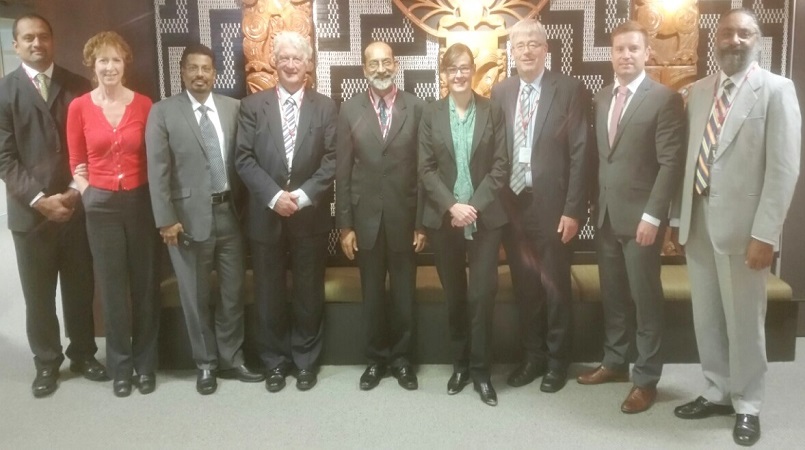
The University of the South Pacific held a High Level Consultation (HLC) with the Government of New Zealand in Wellington.
The impetus of the HLC last Friday was significant in light of the new USP-New Zealand Partnership Agreement which was recently launched by High Commissioner Mark Ramsden on 15 April 2016. Through this new Agreement, the Government of New Zealand provides a total of NZ$15 million for the current triennium (2016-2018).
The four member delegation from USP, led by the Vice-Chancellor and President Professor Rajesh Chandra, met senior officials from MFAT and discussed current and emerging issues of common interest, including Pacific regionalism higher education in the Pacific, and leveraging of collaboration between the University and other governmental and Non-State Actors in order to effectively meet the development needs of the Pacific region.
Ms Deb Collins, Director of the Partnerships, Humanitarian and Multilateral arm of MFAT welcomed the USP Delegation and reiterated New Zealand’s growing confidence in the University.
She stated that “the Government of New Zealand notes the pivotal role that the University is playing towards the development of the Pacific region through its multi-facet role as a high education provider and a regional integration organisation”.
Professor Chandra said the consultation was very productive as it provided a platform for discussion, not only on the implementation of the Strategic Plan 2013-2018 and the challenges faced therein but also on strategic issues of mutual interest facing the region including fostering regionalism and promoting higher education in the Pacific.
“New Zealand continues to convey and demonstrate a high level of confidence in the University and the role it plays towards capacity building and research for the Pacific people,” Professor Chandra emphasised.
Besides the funding provided by New Zealand for the implementation of the Strategic Plan, various other opportunities were identified that could be realised through levering of partnerships with New Zealand-based institutions and the recently established New Zealand Institute for Pacific Research.
The Partnership Development Fund facility of MFAT is an example of such an opportunity which can be drawn upon in consortium with Non-State Actors in New Zealand.
On the ICT front, the International Development Group (IDG) of MFAT is currently working with USP on a design phase for a NZ$4 million USPNet project proposal that the University had submitted as a result of last year’s HLC.
Ms Collins further mentioned that “despite the challenges, USP is making steady progress towards becoming the excellent institution that it aspires to be through the implementation of initiatives in its Strategic Plan”.
For the first time, MFAT also included their representatives on the USP Council (Professor Ian Watson) and University Grants Committee (Professor Pat Walsh).
“They both appreciated the work done by the University in terms of the implementation of our Strategic Plan. I also had a separate meeting with Professor Walsh and Professor Watson which was very enlightening,” Professor Chandra said.
The USP delegation also met with the Executive Director of Universities New Zealand and Executive Director of Academic Quality Agency (AQA) of New Zealand.
“Both these agencies conveyed their continued willingness to engage and assist us where needed.”
Professor Chandra also noted that the last round of USP’s quality audit was undertaken by AQA.
